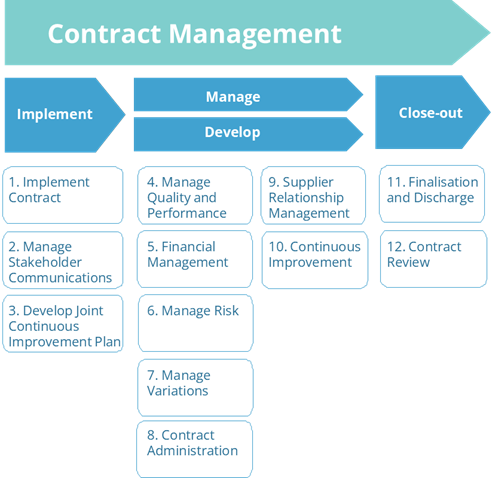Back to News
By Peter Morichovitis, Principal Advisor, Procurement Office & Professional Advisory
Mastering Supplier Relationship Management (SRM)
Councils can differ greatly in their procurement maturity. Some councils may be starting out on a journey to improve their procurement function, while others may have been on the journey for numerous years, having reached a greater level of procurement maturity and performance.
Regardless of the size of your council, the size or maturity of the procurement team, there are six key building blocks to enhancing local government procurement. If you structure your procurement improvement efforts around these six blocks, you can develop and execute a simple and practical design to improve procurement capability and enable procurement value within the organisation.
Six Building Blocks to Enhance Local Government Procurement
This article will focus on the ‘5. Processes’ building block and mastering Supplier Relationship Management.
Mastering Supplier Relationship Management (SRM)
Leading contract management practices emphasise the ongoing development of the contractual environment through strategic supplier relationship management and a joint commitment to continuous improvement. This is depicted in sub-processes 9 and 10 below in the Contract Management process recommended for local government.

Ensuring that the goods/services/works are delivered in accordance with the specification is just the starting point. SRM encompasses developing the relationship with the supplier to extract even greater value through the partnership and synergies for both parties. In its purest form, SRM is “helping the supplier to best help you”. It involves developing and maintaining mutually beneficial partnerships with suppliers to maximise value, minimise risk, and achieve common goals. SRM includes everything from overcoming minor operational hurdles to successfully merging strategic priorities and the gradual engendering of mutual trust and respect between you and the supplier, to maximise value.
Objectives of SRM
Effective SRM helps you build resilient and sustainable supply chains, drive operational excellence, and gain a competitive edge in the marketplace. Its key objectives include:
- Developing strong supplier partnerships based on trust, collaboration, and mutual understanding.
- Enhancing supplier performance in terms of quality, delivery, cost, and innovation.
- Mitigating supply chain risks by closely monitoring and managing supplier capabilities, dependencies, and vulnerabilities.
- Optimising costs and achieving savings through effective supplier management, negotiation, and value engineering.
- Promoting innovation and driving joint initiatives with suppliers to create competitive advantages.
- Ensuring compliance with legal, regulatory, and ethical requirements throughout the supply chain.
Driving SRM
Key actions for driving SRM include:
- Being proactive in efforts to identify and deal with potential problems before they occur.
- Establishing specific, senior points of contact to whom issues will be elevated in the event they are not satisfactorily resolved at the contract management level.
- Regularly and actively soliciting suppliers’ concerns regarding any aspect of their relationship.
- When issues arise, resolving them as openly and expeditiously as possible. Minor problems can often be addressed informally, but more significant issues will require focused attention.
Other factors that encourage the development of a successful relationship between the organisation and the supplier include:
- Recognising that actions and attitudes affect the tone of the relationship.
- Ensuring that the governance arrangements are fair.
- Ensuring that relationships between the parties are peer-to-peer as far as possible.
- Ensuring that roles and responsibilities are clearly understood by both parties and that the necessary authority levels are in place.
- Ensuring that escalation routes are clear and understood and that problems are resolved as early as possible and as low down the management structure as possible.
- Separating strategic matters from day-to-day service delivery issues.
- Ensuring that appropriate attitudes and behaviour are practised and displayed to assist the promotion of a positive and constructive relationship.
- Communicating and sharing information at the appropriate level with the supplier, for example strategic, business and operational levels, and as openly as possible.
Mastering SRM
To master SRM, follow these key steps:
- Establish clear objectives: Define your expectations and goals for supplier relationships, such as quality, delivery, cost, and innovation. This should be conducted in the tender/quote documentation and processes for going to market.
- Select the right suppliers: Conduct thorough evaluations and choose suppliers who align with your objectives, have a good track record, and offer competitive pricing. This should be conducted through your tender/quote evaluation.
- Effective communication: Maintain open and transparent communication channels with your suppliers. Regularly share information, discuss concerns, and provide feedback.
- Build mutual trust: Foster trust and collaboration by honouring commitments, being reliable, and resolving conflicts in a fair and timely manner.
- Collaborative approach: Work closely with suppliers to identify areas of improvement, explore cost-saving opportunities, and drive innovation through joint initiatives.
- Performance measurement: Establish metrics to evaluate supplier performance objectively. Monitor KPIs such as on-time delivery, quality, responsiveness, and cost.
- Continuous improvement: Regularly review and assess supplier performance to identify areas for improvement. Provide feedback and support their efforts to enhance their capabilities.
- Supplier development: Invest in the development of your suppliers by providing training, sharing best practices, and facilitating knowledge transfer. Help them grow and enhance their ability to best meet your requirements.
- Relationship management tools: Utilise technology and software systems to streamline communication, track supplier performance, and manage contracts effectively.
- Regular reviews and feedback: Conduct periodic performance reviews with suppliers to discuss progress, address issues, and align future objectives.
Conclusion
Mastering SRM is a critical enabler of Contract Management success in local government. While strong contract management processes provide the foundation, it is the strength of relationships with suppliers that determines how effectively you can deliver value under the contract.
In a time where collaboration, innovation, and value creation are more important than ever, investing in SRM is not just beneficial—it’s essential. Help the supplier to best help you!
If you would like any further information or support in mastering SRM in your council, please contact Brian Jackson, General Manager – Consulting Services, bjackson@wearepeak.com.au